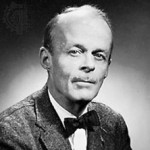I’ve heard the wolves scuffle, and said: So this Is man; so – what better conclusion is there – The day will not follow night, and the heart Of man has a little dignity, but less patience Than a wolf’s, and a duller sense that cannot Smell its own mortality.
Allen Tate Quotes
I am not ridiculing verbal mechanisms, dreams, or repressions as origins of poetry; all three of them and more besides may have a great deal to do with it.
Similar Quotes
Cricket is the greatest game that the wit of man has yet devised.
- Sir Pelham WarnerAdvertising is selling Twinkies to adults.
- Donald R. VanceThe struggle of the male to learn to listen to and respect his own intuitive, inner prompt...
- Herb GoldbergEach generation of the church in each setting has the responsibility of communicating the ...
- Francis SchaefferEach had defended his own country; the Germans Germany, the Frenchmen France; they had don...
- Ernst TollerComments on: "Allen Tate Quotes: I am not ridiculing verbal mechanisms, dreams, or repressions as origins of poetry;..."

| Birth: | 19th November, 1899 |
| Death: | 9th February, 1979 |
| Nationality: | American |
| Profession: | Essayist, Poet |
Tate was born near Winchester, Kentucky to John Orley Tate, a businessman, and Eleanor Parke Custis Varnell. In 1916 and 1917 Tate studied the violin at the Cincinnati Conservatory of Music.
He began attending Vanderbilt University in 1918, where he met fellow poet Robert Penn Warren. Warren and Tate were invited to join a group of young Southern poets under the leadership of John Crowe Ransom; the group were known as the Fugitive Poets and later as the Southern Agrarians. Tate contributed to the group's magazine The Fugitive and to the agrarian manifesto I'll Take My Stand published in 1930, and this was followed in 1938 by Who Owns America? Tate also joined Ransom to teach at Kenyon College in Gambier, Ohio. Some of his notable students there included the poets Robert Lowell and Randall Jarrell. Lowell's early poetry was particularly influenced by Tate's formalist brand of Modernism.
In 1924, Tate moved to New York City where he met poet Hart Crane, with whom he had been exchanging correspondence for some time. Later,he went to Europe. In London he visited with T.S. Eliot, whose poetry and criticism he greatly admired, and he also visited Paris. After two years abroad, he returned to the United States, and in 1930 was back in Tennessee.
Tate died in Nashville, Tennessee. His papers are collected at the Firestone Library at Princeton University.
Related Authors
Advertisement
Today's Anniversary - 19th December
Births
- 1944 - Tim Reid
- 1956 - Alice Barrett
- 1952 - Nile Rodgers
- 1906 - Leonid Ilyich Brezhnev
- 1934 - Al Kaline
Deaths
- 1968 - Norman Thomas
- 1953 - Robert Millikan
- 1986 - Virginia C. Andrews
- 2002 - Lewis B. Smedes
- 1997 - Masaru Ibuka
Quote of the day
Popular Topics
About Quoteswave
Our mission is to motivate, boost self confiedence and inspire people to Love life, live life and surf life with words.


Share with your friends